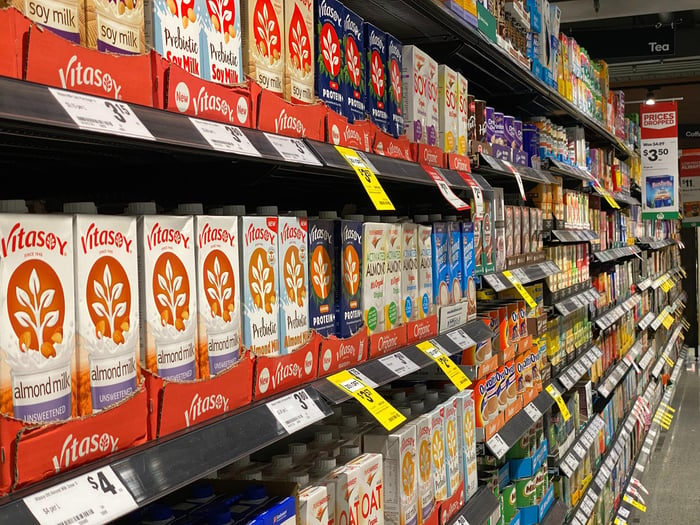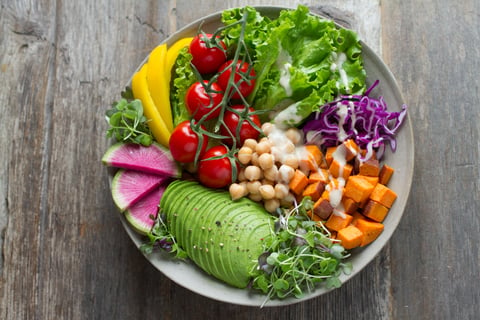
Ever find yourself standing in that grocery aisle, surrounded by plant-based milk, and wondering which one to buy? Yeah, we've been there. So, here's a list of plant-based milk you're bound to come across so you can decide which ones are for you.
1. Soy Milk
If you're worried about losing out on all of the nutrition that you think you're getting from cow milk, consider buying soy milk. Its nutrition profile is similar to low fat cow's milk. Soy contains all nine essential amino acids, making this milk rich in protein, good fats, and carbs. Soy milk offers 8 grams of carbohydrates, 7 grams of protein, yields 100 calories in an 8-ounce pour and also contains about 299 mg of calcium and is fortified with vitamin D.
Sustainability quotient: Studies show the greenhouse gas (GHG) emissions associated with soy production are much lower than dairy. Since soybeans are legumes, they also fix nitrogen in the soil, which reduces the need for nitrogen fertilizers. Soy Milk is considered one of the most sustainable milk.
Soy Milk can be added to your oatmeal, smoothies, pancakes, waffles, and much more.
 @earthlinged's review of Soya Milk Unsweetened from Alpro
@earthlinged's review of Soya Milk Unsweetened from Alpro
2. Almond Milk
Almond milk may not be as good as soy when it comes to protein, but it's packed with calcium. This milk's also a great source of Vitamin E, which is good for your brain, skin, and blood. When shopping for almond mylks, check its almond percentage. You're looking for the mylk that has high almond content to get all the benefits.
However, almond milk has received major flack on its sustainability quotient. Almond milk scores very low on environmental impact.

Almond mylk works wonderfully with cereals, smoothies, ice creams, tea, coffee, and it also helps add a creamy depth to your soup and curries.
 @aaliyah16's review of Almond Breeze Unsweetened Original Milk by Blue Diamond Almond
@aaliyah16's review of Almond Breeze Unsweetened Original Milk by Blue Diamond Almond
3. Oat Milk
Oat milk has taken the world by storm, especially since it's taste is so similar to cow milk. If you miss the taste of dairy, this is the mylk for you. It helps that this milk is high in beta-glucan, which helps maintain your blood sugar as well as keeps your digestive and heart health in check. Oat milk contains fiber, more vitamin A than dairy milk, iron, and calcium. Oat milk helps strengthen bones and the fiber content can boost the immune system and aid with digestion.
If you're planning to add oat milk to your coffee, we suggest getting a barista version as it helps build up that rich microfoam we love! In addition to this, oat milk can be added to Indian masala chai and smoothies.
Sustainability quotient- An LCA study said that "The production of its oat milk results in 80 percent lower GHG emissions and 60 percent less energy use compared to cow’s milk. The study also found it uses about 80 percent less land. Of all of the plants turned into milk, oats generally use the least water." Oat milk is the clear winner for the environment.
 @warmhealer's review of The Original Oat Drink Barista Edition by Oatly
@warmhealer's review of The Original Oat Drink Barista Edition by Oatly
4. Coconut Milk
Coconut milk introduces a whole new world of flavor profile. You can add it everywhere, from your coffees or your curries and get lost in its rich tropical taste. This mylk is like a holiday in your mouth. Coconut milk contains zinc and selenium are great for improving the immune system. It also contains minerals, magnesium, phosphorus, and manganese.
Sustainability quotient: Since coconut trees only grow in tropical climates, the pressure to meet global demand is causing exploitation of workers and destruction of rainforests. A good option is to choose coconut products that are certified in Fair Trade.
 @mericrist's review of Coconut Milk by Alpro
@mericrist's review of Coconut Milk by Alpro
5. Rice Milk
Rice milk is one of the OGs when it comes to cow milk substitutes. It's also the least allergenic of any milks out there, so for all you peeps with any kind of allergies (from lactose to soy), check this one out! Rice milk contains calcium, phosphorus, and vitamin A. It also has roughly 23 grams of carbohydrates, 1 gram of protein, and 2.5 grams of fat with a caloric intake of about 120 calories per serving.
Rice milk is very light, so if you're planning to use it for baking, you may need to add some thickening agents, like flour, to add some depth to your baked goods.
Sustainability quotient: The Oxford study, indicates that rice milk produces more greenhouse gas emissions than any other plant milk. Bacteria breeding in rice paddies pump methane into the atmosphere and large amounts of fertilizer pollute waterways.
 @visalinathan's review of Rice Milk Enriched by Pureharvest
@visalinathan's review of Rice Milk Enriched by Pureharvest
6. Pistachio Milk
Just like any other nut milk, Pistachio milk's full of healthy fats. It contains more potassium and vitamins K and B-6 than almond milk, and up to 6 grams of proteins per ounce, making this one of the healthier options when it comes to plant-based milk.
This milk will be a fantastic addition to your desserts. You can also add it to your hot chocolate, oats, cereals, smoothies, and much more!
 @cocothekoala's review of Real Pistachio Mylk by Sunkist
@cocothekoala's review of Real Pistachio Mylk by Sunkist
7. Macadamia Milk
Concerned about the water footprint of your plant-based mylks? Try Macadamia Milk, it's just as tasty as other nut milk and needs much less water.
Macadamia nut milk is versatile and can be used in all places that call for dairy milk. From cereals to cakes, you can use this milk everywhere!
 @junkfoodvegans' review of Macadamia milk by MILKLAB
@junkfoodvegans' review of Macadamia milk by MILKLAB
8. Pea Milk
For the uninitiated, this mylk might come as a shocker. But don't worry, this milk is neither green not does it taste like pea. In terms of nutrition, pea mylk contains just as much amount of protein as soy. When compared to cow's milk, pea milk has a third of fat and 50% more calcium! It also has about 4.5 grams of fat, a great dose of omega-3 fatty acids, and about 450 mg of potassium.
Pea mylk tastes just like almond milk, but it's a little more creamy. You can also add it to your coffee, as it's silky texture's great for making latte art.
Sustainability quotient: Pea milk is a sustainable choice that is high in protein and involves less pesticide use, depending on the brand and variety.
 @appleappleamanda's review of Pea milk by Ripple
@appleappleamanda's review of Pea milk by Ripple
9. Walnut Milk
Walnuts are one of the best sources of essential omega-3 fatty acids. Drinking walnut milk ensures that your brain and heart stay healthy.
Unlike other mylks, walnut milk sticks to it's rich taste profile. It's a great addition to your bakes and desserts.
 @alyrauff's review of Walnut Milk Original by 137 degrees
@alyrauff's review of Walnut Milk Original by 137 degrees
10. Hazelnut Milk
While not as popular as other mylks, Hazelnut milk's nutrition profile is what sets it apart. It's packed with vitamins B & E, folic acid, and omega-3. It has a slightly nutt-y taste and will add a nice earthy note to your coffee.
Make choco-hazelnut milk by mixing melted chocolate, vanilla syrup, and maple syrup to this mylk. It's so good, tastes just like liquid Nutella. Hazelnut's a great flavor that works best with chocolate, so you can think of using this milk in anything chocolaty.
Sustainability quotient- Performing better than almond milk is the hazelnuts. Hazelnuts are pollinated by the wind rather than commercial honeybees.

review of Organic Hazelnut Unsweetened Milk by Plenish
11. Cashew Milk
Cashews are a good source of unsaturated fats. Cashew milk is usually fortified with vitamin D, B-12, calcium, and vitamin A. Since this mylk is really creamy, it makes a great base for curries, sauces, or oatmeal.
Sustainability quotient: Cashew milk is considered a sustainable choice since it uses minimal land to grow the plants, especially compared to other plant-based milk. Nearly 60% of cashews are grown in India and there are known human rights issues surrounding the production of cashews, harsh conditions for workers, including the use of labor camps in some areas where cashews are grown and processed for milk.
 @marthsalt's review of Cashew Milk by Alpro
@marthsalt's review of Cashew Milk by Alpro
12. Pumpkin seed Milk
The American Heart Association recommends that we consume at least a quarter cup of pumpkin seeds each day to stay healthy. Pumpkin seeds are a nutrition powerhouse as they're a great source of magnesium, selenium, zinc, protein, and fiber. This milk may be an acquired taste, but once you get the hang of it, you'll keep wanting more!
Pumpkin seed milk's smooth and creamy. It's a great option for those looking for dairy and nut-free milk substitutes.
 @cocothekoala's review of Pumpkin Seed Milk by Nutty Milk Factory
@cocothekoala's review of Pumpkin Seed Milk by Nutty Milk Factory
13. Hemp Milk
Hemp mylk is buttery and has a nutty note. Since hemp's a natural source of calcium, it doesn't need to be fortified like other plant-based mylks. Along with calcium, it's also a great source of iron, zinc, and magnesium.
Since hemp mylk's so creamy, it's a great companion to coffee. It can also be added to smoothies, cerals, and baked foods.
Sustainability quotient- Hemp farming does require more water than oat, soy or pea.
 @beccabee's review of Creamy Hemp Seed Milk by Good Hemp
@beccabee's review of Creamy Hemp Seed Milk by Good Hemp
14. Tiger nut milk
Tiger nuts are a great source of calcium, magnesium, zinc, potassium, phosphorous, and sodium. It has healing effects for your digestion, immune system, and is also an aphrodisiac!
You can add sugar to the mylk and serve it chilled. This sweetened mylk is called "La Horchata de Chufa" and is a popular Spanish beverage.
Sustainability quotient: No clear studies are made on tiger nut milk yet. But is considered easy to grow.
 @theamicablevegan's review of Tiger Nut Milk by Rude health
@theamicablevegan's review of Tiger Nut Milk by Rude health









